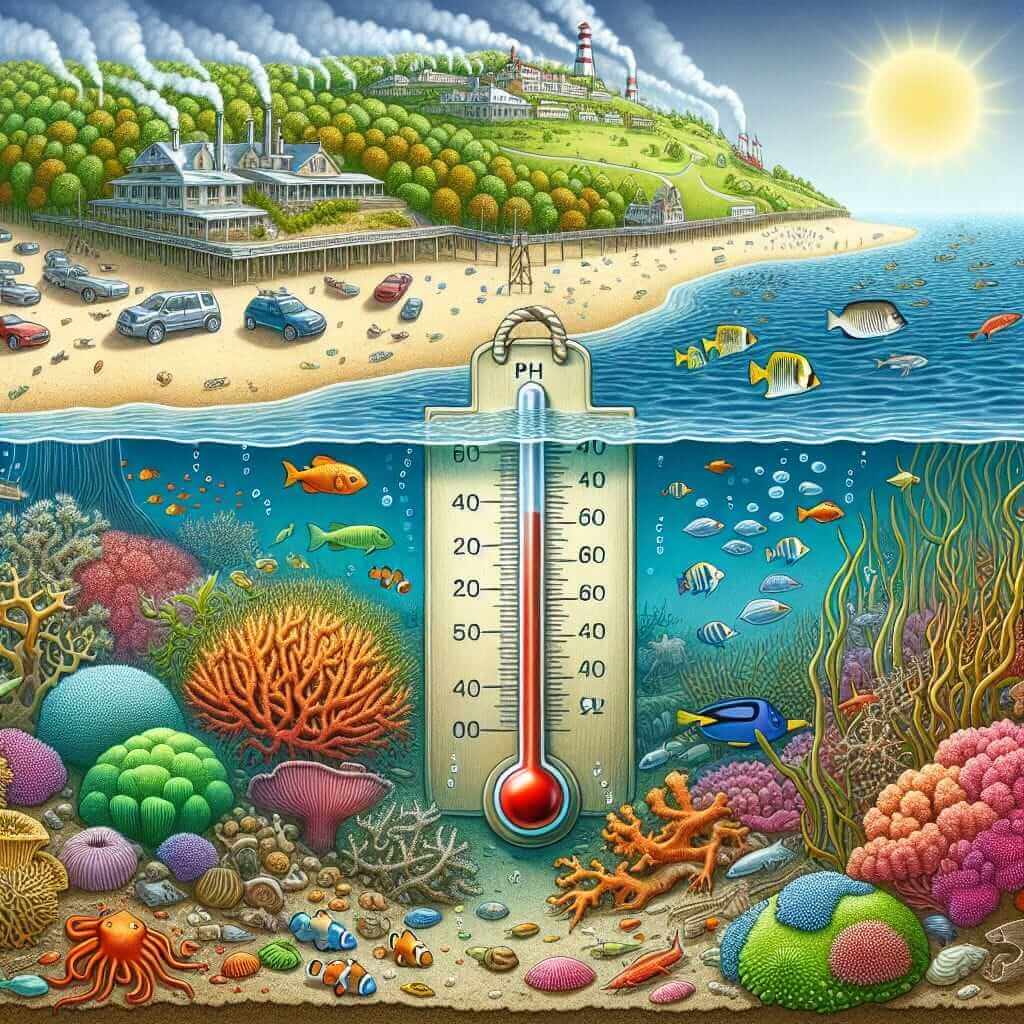The IELTS Reading section tests your ability to comprehend and analyze written English. One of the common themes that could appear in the IELTS Reading exam is climate change and its impacts, especially on marine ecosystems. This topic, given its relevance in current affairs and historical significance, has a high likelihood of being featured in future exams.
Reading Passage: The Impacts of Climate Change on Marine Ecosystems
In today’s practice, we will focus on a medium-level text to prepare you for the IELTS Reading exam. This text will explore “What are the impacts of climate change on marine ecosystems?”
Practice Reading Passage
Climate change has become a dominating force altering marine ecosystems worldwide. Increasing water temperatures, ocean acidification, and sea level rise are some of the most significant factors contributing to these changes. These impacts ripple through the marine food web and affect both biodiversity and the health of human communities relying on marine resources.
Temperature and Species Migration
A rise in sea temperatures has forced many marine species to migrate toward the poles in search of cooler waters. Studies have shown that species such as fish, crustaceans, and even certain types of plankton are moving an average of 72 kilometers north every decade. This migration disrupts existing marine ecosystems, often leading to a decline in local biodiversity and altered interspecies relationships.
Ocean Acidification and Coral Reefs
The absorption of increased carbon dioxide levels by the oceans leads to ocean acidification. This phenomenon has devastating impacts on coral reefs, home to some of the richest biodiversity in marine life. Acidic waters weaken coral skeletons, making them more susceptible to breakage and disease. Consequently, many coral reefs are undergoing bleaching events at unprecedented rates, leading to a decline in reef-associated species.
Sea Level Rise and Coastal Ecosystems
Rising sea levels pose a significant risk to coastal ecosystems, including mangroves, estuaries, and salt marshes. These ecosystems serve as breeding grounds and nurseries for many marine species. Flooding and increased salinity can lead to the loss of these vital habitats, affecting the species that depend on them for survival and reproduction.
Impacts on Biodiversity and Human Communities
The cumulative effects of these changes disrupt the balance of marine ecosystems. Loss of biodiversity can lead to the collapse of food webs, affecting species at all levels, from primary producers to apex predators. For human communities, particularly those in developing countries, the decline in fish stocks and degradation of marine resources translate into economic losses and food insecurity.

Questions
To practice, we will use various question types typical for the IELTS Reading exam. Answer the questions based on the passage above.
Multiple Choice Questions
-
What is the average distance marine species are migrating due to rising temperatures?
A. 100 kilometers
B. 72 kilometers
C. 50 kilometers
D. 20 kilometers -
What effect does ocean acidification have on coral reefs?
A. Increases their growth rate
B. Strengthens coral skeletons
C. Leads to coral bleaching events
D. Promotes biodiversity
True/False/Not Given
-
Marine species are moving southward at an average of 72 kilometers every decade.
- True
- False
- Not Given
-
Rising sea levels primarily affect only pelagic (open sea) ecosystems.
- True
- False
- Not Given
Summary Completion
- Complete the summary using the list of words below.
Climate change is causing marine species to towards cooler waters, which disrupts ecosystems. Ocean weakens coral skeletons, leading to __ events. Coastal ecosystems are also at risk due to _____ sea levels.
- bleaching
- migrate
- increased
- acidification
Answer Keys
Multiple Choice Questions
- B. 72 kilometers
- C. Leads to coral bleaching events
True/False/Not Given
- False
- False
Summary Completion
- Migrate, acidification, bleaching, increased
Common Mistakes and Tips
When practicing reading comprehension:
- Carefully analyze the keywords in the questions and match them with corresponding details in the text.
- Pay attention to synonyms and paraphrasing, as the IELTS often uses different words or phrases with similar meanings to test comprehension.
- Manage your time efficiently, as reading passages can be lengthy and complex.
Vocabulary
Here are some keywords from the passage that might be challenging:
- Migration (Noun) | /maɪˈɡreɪʃən/ | The movement of species from one place to another.
- Acidification (Noun) | /əˌsɪdɪfɪˈkeɪʃən/ | The process of becoming acidic.
- Biodiversity (Noun) | /ˌbaɪoʊdaɪˈvɜrsɪti/ | The variety of life in the world or a particular ecosystem.
Grammar Point
Notice the use of modal verbs in the passage, such as “can” and “will.”
Usage Example:
- Modal verb “can” for ability or possibility:
- “Loss of biodiversity can lead to the collapse of food webs.”
Conclusion and Further Practice
To excel in the IELTS Reading section, practice regularly with passages on current and relevant topics. Focus on improving your reading speed and comprehension accuracy. For further practice on similar topics, you can check out our other articles on the effects of climate change on polar ecosystems and how climate change is affecting coral reef ecosystems.
These strategies and practice passages will help you build the skills needed to achieve a high score on the IELTS Reading test. Good luck!